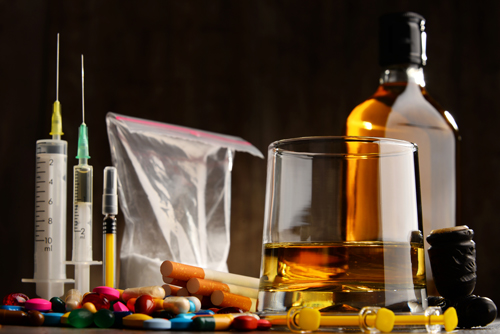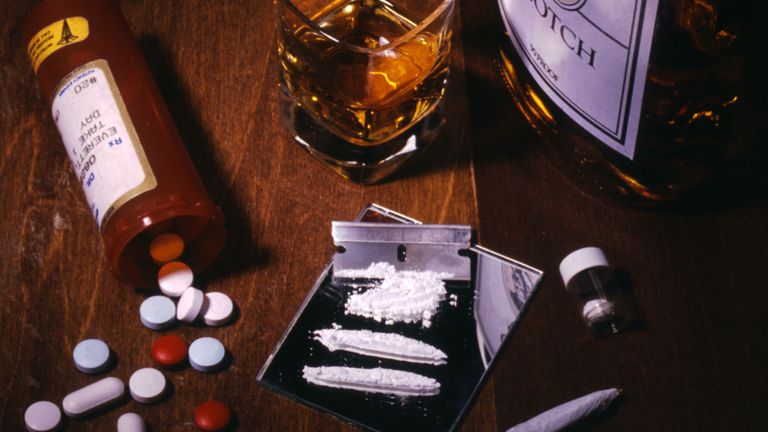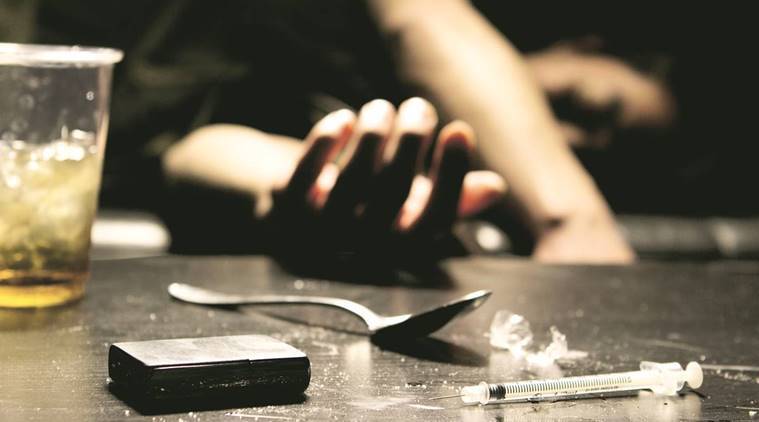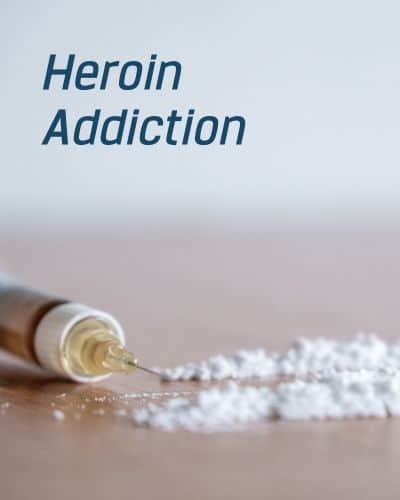What is Heroin?
Heroin is a drug that reaches the brain very fast once it’s consumed, for this reason, it is very easy for a person to develop heroin addiction even from one or a few uses. Before we get to the main topic, let’s learn about what heroin is. According to the scientific piece ‘Heroin’, published by The National Library of Medicine, “Heroin is a white or brown powder or a black, sticky goo.
It’s an opioid drug made from morphine, a natural substance in the seedpod of the Asian poppy plant. It can be mixed with water and injected with a needle. Heroin can also be smoked or snorted up the nose. All of these ways of taking heroin to send it to the brain very quickly. This makes it very addictive.
Regular use of heroin can lead to tolerance. This means users need more and more drugs to have the same effect. At higher doses over time, the body becomes dependent on heroin. If dependent users stop, they will have heroin withdrawal symptoms. These symptoms include restlessness, muscle and bone pain, diarrhea and vomiting, and cold flashes with goosebumps. That is why a medical heroin detox process is very needed.


Get Your Life Back
Find Hope & Recovery. Get Safe Comfortable Detox, Addiction Rehab & Dual Diagnosis High-Quality Care.
Hotline(844) 597-1011What Does Heroin Feel Like?
Curiosity about the effects of heroin use can lead someone to try the drug. People who misuse prescription opioids sometimes transition to heroin because it could be cheaper, more available, or more potent. So, what does a heroin high feel like? What is it that causes an addiction to develop so easily?
When someone first uses heroin, the high is often pleasurable. A rush of euphoria and a false sense of well-being can also come with a relief of pain, anxiety, and depression. A heroin high can feel like an escape and is often used as a recreational drug or a method of self-medication. Other feelings often associated with a heroin high include a sense of safety and well-being, despite the actual surroundings or environment.
Heroin binds to opioid receptors in the brain, resulting in a release of endorphins that causes the high. This sensation leads to changes in feelings, thoughts, and sensations. While most people feel the initial heroin high is pleasant, some may have negative experiences, but this depends on the individual.
The reason people want to experience a high from heroin is because of the euphoria it can bring, especially if they might not otherwise feel pleasure often due to depression or other conditions.
Get Help. Get Better. Get Your Life Back.
Searching for Accredited Drug and Alcohol Rehab Centers Near You?
Even if you have failed previously and relapsed, or are in the middle of a difficult crisis, we stand ready to support you. Our trusted behavioral health specialists will not give up on you. When you feel ready or just want someone to speak to about therapy alternatives to change your life call us. Even if we cannot assist you, we will lead you to wherever you can get support. There is no obligation. Call our hotline today.
(844) 597-1011Heroin High Effects
If you know someone who is abusing heroin, you may wonder what the heroin high symptoms are. The main symptom of a heroin high is an unnatural sense of happiness or well-being. There are also many other symptoms of heroin intoxication that can accompany a heroin high. These can include:
- Dry mouth
- Flushed, warm skin
- Tiredness and weakness
- Nausea or vomiting
- Confusion or clouded thinking
- Severe itchiness
- Shifting in and out of semi-consciousness
- Slowed breathing
- Coma
- Absent breathing, leading to death
Following the euphoric rush of using heroin, people will become sleepy while intoxicated, so they may seem extremely drowsy, or they could nod off. People who use heroin are often known to fall asleep anywhere at any time.
Nodding Off
Nodding off can refer to falling asleep, but in the context of using heroin, it is much more serious. “Nodding off” refers to drifting in and out of consciousness. This is particularly dangerous as it indicates someone is on the edge of a life-threatening overdose. There is a possibility that someone may not return to consciousness when drifting into unconsciousness.
Heroin intoxication that occurs during a heroin high can lead to overdose and death relatively easily. First, while someone is experiencing heroin high effects, they’re also experiencing changes in how their brain is functioning. This is what causes changes in mood and perception.
When heroin enters the brain, it is converted into morphine before binding to the opioid receptors in the central nervous system. That’s why heroin’s high effects include euphoria and pleasure. When heroin binds to the opioid receptors, the rush of feel-good dopamine is much higher than what you could experience from natural pleasure.
The euphoric rush and other effects are short-lived, but during the high, heroin intoxication can cause extreme drowsiness, leading the person to slip in and out of consciousness or nod off.
First-class Facilities & Amenities
World-class High-Quality Addiction & Mental Health Rehabilitation Treatment
Rehab Centers TourRenowned Addiction Centers. Serene Private Facilities. Inpatient rehab programs vary.
Addiction Helpline(844) 597-1011Proven recovery success experience, backed by a Team w/ History of:
15+
Years of Unified Experience
100s
5-Star Reviews Across Our Centers
10K
Recovery Success Stories Across Our Network
- Low Patient to Therapist Ratio
- Onsite Medical Detox Center
- Comprehensive Dual-Diagnosis Treatment
- Complimentary Family & Alumni Programs
- Coaching, Recovery & Personal Development Events
How Long Does A Heroin High Last?
If a heroin user has been addicted to the drug for a long time, the high will typically be shorter and the person will need to take more of the drug to achieve an intensity equal to when the drug was first taken. But how the drug is taken can also affect the high. Snorting heroin typically takes longer for the high to set in (about 10 minutes) and results in a less intense high for a shorter period (about half an hour).
Combining heroin with other drugs can also intensify heroin’s effects. Heroin is commonly combined with cocaine, for example, or alcohol. However, this can increase the risk of overdose. Heroin dealers may also combine the drug with fentanyl to sell more of the drug cheaply. But this combination can be deadly.
How Long Does Heroin Last In The Body?
Heroin withdrawal begins within a few hours of the last time the drug was used for someone who has developed a heroin dependency. That means that as soon as the high wears off in two to three hours, you may experience withdrawal symptoms. People who use heroin often seek more of the drug right away to get the high back. This is why it is very difficult to combat heroin addiction.

If you stop using heroin without a medical detox treatment, you could experience:
- Vomiting
- Diarrhea
- Muscle pain
- Chills
- Sleeplessness
- Cravings
World-class, Accredited, 5-Star Reviewed, Effective Addiction & Mental Health Programs. Complete Behavioral Health Inpatient Rehab, Detox plus Co-occuring Disorders Therapy.
CALL(844) 597-1011End the Addiction Pain. End the Emotional Rollercoaster. Get Your Life Back. Start Drug, Alcohol & Dual Diagnosis Mental Health Treatment Now. Get Free No-obligation Guidance by Substance Abuse Specialists Who Understand Addiction & Mental Health Recovery & Know How to Help.
Increased Tolerance, Dependence & Addiction
Heroin is a highly addictive drug. That’s because people who regularly use heroin often develop a tolerance, which means that they need higher and/or more frequent doses of the drug to get the desired effects. A substance use disorder (SUD) is when continued use of the drug causes issues, such as health problems and failure to meet responsibilities at work, school, or home. A SUD can range from mild to severe, the most severe form being addiction.
As stated by The National Institute on Drug Abuse, in the piece ‘Heroin DrugFacts’, Those who suffer from heroin addiction and stop using the drug abruptly may have severe withdrawal. Withdrawal symptoms, which can begin as early as a few hours after the drug was last taken, include:
- Cold flashes with goosebumps (‘Cold turkey’)
- Uncontrollable leg movements (‘Kicking the habit’)
- Severe heroin cravings
- Restlessness
- Severe muscle and bone pain
- Sleep problems
- Diarrhea and vomiting
On the authority of the scientific piece ‘[Heroin Addiction]’, Sándor Hosztafi, published by The National Library of Medicine, recent research has shown that major withdrawal symptoms peak between 48 and 72 hours after the last dose of heroin and subside after about a week. At this time, weakness and depression are pronounced and nausea and vomiting are common. Nevertheless, some chronic addicts have shown persistent withdrawal signs for many months or even years. Heroin Addiction is considered as a behavioral state of compulsive drug use and a high tendency to relapse after periods of abstinence.
Researchers are studying the long-term effects of opioid addiction on the brain. Studies have shown some loss of the brain’s white matter associated with heroin use, which may affect decision-making, behavior control, and responses to stressful situations.

Heroin Addiction Treatment
Treatment for heroin addiction includes medical detox treatments and behavioral therapies for addiction. For a treatment to be effective, it’s important to match the best treatment approach to meet the particular needs of each patient. Medicines are being developed to help with the withdrawal process. The FDA approved lofexidine, a non-opioid medicine designed to reduce opioid withdrawal symptoms.
Medicines to help people stop using heroin include Buprenorphine and Methadone. They work by binding to the same opioid receptors in the brain as heroin, but more weakly, reducing cravings and withdrawal symptoms. Another treatment is Naltrexone, which blocks opioid receptors and prevents opioid drugs from having an effect. A NIDA study found that once treatment is initiated, both a Buprenorphine/Naloxone combination and an extended release Naltrexone formulation are similarly effective in addiction. Because full detoxification is necessary for treatment with naloxone, initiating treatment among active users was difficult, but once detoxification was complete, both medications had similar effectiveness.
Behavioral therapies for Heroin Addiction include methods called Cognitive-Behavioral therapy and contingency management. Cognitive-Behavioral therapy helps modify the patient’s drug-use expectations and behaviors, and helps effectively manage triggers and stress. Contingency Management provides motivational incentives, such as vouchers or small cash rewards for positive behaviors such as staying drug-free. These Behavioral Treatment approaches are especially effective when used along with medicines.
National Institute on Drug Abuse
Heroin Addiction is a serious condition that should not be taken lightly. We Level Up rehab treatment & detox center can provide you, or someone you love, the tools to recover from heroin addiction with professional and safe treatment. Feel free to call us to speak with one of our counselors. We can inform you about this condition by giving you relevant information. Our specialists know what you are going through. Please know that each call is private and confidential.
Experience Transformative Recovery at We Level Up Treatment Centers.
See our authentic success stories. Get inspired. Get the help you deserve.
Start a New Life
Begin with a free call to an addiction & behavioral health treatment advisor. Learn more about our dual-diagnosis programs. The We Level Up Treatment Center Network delivers recovery programs that vary by each treatment facility. Call to learn more.
- Personalized Care
- Caring Accountable Staff
- World-class Amenities
- Licensed & Accredited
- Renowned w/ 100s 5-Star Reviews
We’ll Call You






